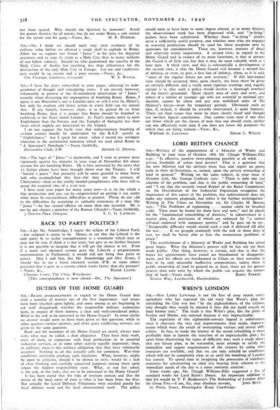WREN'S LONDON
Snt,—Miss Lesley Lawrence is not the first of your recent corre- spondents who has repeated the old story that Wren's plan for rebuilding the City was lost "by the pigheadedness of the citizens, who thought they would be cheated if they did not build. exactly on their former sites." The truth is that Wren's plan, like the plans of Evelyn and Hooke, was rejected because it was impracticable.
The repetition of this eighteenth-century legend. is unfortunate, since it obscures the very real improvements then made, improve- ments which were the result of overcoming various and severe diffi- culties. In fact, to study the history of the actual rebuilding is more profitable than to lament the rejection of an impracticable plan ; for apart from discovering the types of difficulty met, such a study shows that any future plan, to be successful, must attempt to satisfy the immediate and urgent requirements of the citizens by using what resources are available, and that we can only rebuild on conditions which will not be completely. clear to us until the bombing of London has ceased. To spend time in imagining the possession of indefinite resources for constructing an ideal city bearing little relation to the immediate needs of the day is a mere romantic exercise. Some weeks ago, Mr. Clough Williams-Ellis suggested a list of standard works for Lord Reith's library. An important addition to that list would be T. F. Reddaway's The Rebuilding of London After the Great Fire.—! am, Sir, your obedient servant, JOHN Burr. 20 Priory Street, Huntingdon Road, Cambridge.


























































 Previous page
Previous page